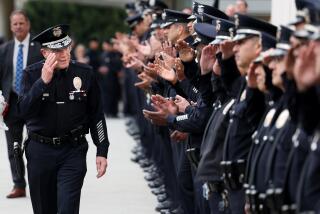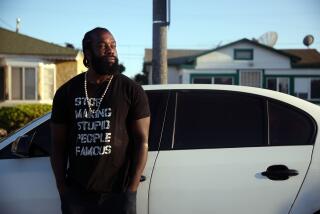We need police, not cops
- Share via
IN LOS ANGELES, as in most big cities, the populace is divided about how it sees members of local law enforcement. To one group they are “the police.” To another they are “the cops.”
The police are an expression of citizenship and order, important servants of the community. Police are always welcome, never threatening and rarely unsettling. Cops, on the other hand, are rarely welcome, frequently threatening and always unsettling. They are not servants but soldiers fighting a perpetual battle in a place they view as less a community than a militarized zone in which order must be kept at all costs -- not so much to keep the zone safe but to assure the real communities elsewhere that the police are doing their job.
The Rampart report issued last week by a blue-ribbon panel affirmed this ancient division. It also acknowledged that years of court orders, commissions, reforms and street protests have done little to alter the paradigm of the “thin blue line” that consciously separates police from cops, white from black, prosperity from poverty.
These divisions are real. But reality has always been more complicated. I grew up in South L.A. among the cops. I didn’t live in desperate conditions; people didn’t throw bricks at squad cars whenever they came around. I lived on a perfectly middle-class block full of black families who believed in the necessity of good police as reflexively as they believed in the necessity of a good education.
But it was a belief born more of faith than of experience, tempered by a history of enmity with cops. And that was true not just in L.A. but everywhere people had come from: Texas, Louisiana, Arkansas, Oklahoma. Cops were simply the most visible enforcers of a punitive system designed to keep blacks in their place, beginning with the places they lived. People called the cops when they needed them -- that’s what they paid taxes for -- but they also braced for their arrival. There was always a sense that when they came on the scene, anything could happen.
In the actual and psychological battle waged by the “warrior” police, black people needed warriors of their own -- armed not with guns but with a cause. Their cause, in this case, was empathetic and balanced policing. Michael Zinzun, the co-founder of the Coalition Against Police Abuse, was one such warrior. Coincidentally, he died July 9, just before the Rampart report was released.
Zinzun was one of those longtime activists I came to take for granted, in part because I’d come to take for granted the intractability of the situation he was trying to change. Cops continued to be cops, and blacks were still the most common victims of brutality, or at least of questionable tactics: the Eula Loves of the 1970s became the Ron Settles of the 1980s, the Rodney Kings of the 1990s and the young Devin Browns and Margaret Mitchells of the new millennium.
Zinzun was not trying to somehow make these tragedies whole so much as he was trying to alter the climate within police departments that produced them. He ran this effort out of a modest office on Western Avenue in South L.A., downstairs from a criminal lawyer. A former Black Panther, he had seen firsthand how countering violence with violence didn’t work; he had also seen how countering it with reason and whatever political pressure existed at any given moment (not much) didn’t often work either.
Like so many black activists shaped by the ‘60s, Zinzun probably realized years ago that he couldn’t retire, or that if he did, it would be with the knowledge that the job was hardly done. Nor would there necessarily be people to take his place. Activism is simply not an attractive career option to many blacks who’ve opted into the middle class and opted out of eternal, exhausting problems like relations with law enforcement.
But we can’t get tired now. This is a problem that touches us all; there’s not a single black man I know who hasn’t had a run-in with the cops, all symptoms of a sickness felt most acutely, but by no means exclusively, in the poorest neighborhoods.
The thin blue line divides not just geography and class, as the Rampart report suggests and as Zinzun and others knew all too well. With any luck, the events of last week mark the beginning of the end of cops and the advent of more police.
More to Read
Sign up for Essential California
The most important California stories and recommendations in your inbox every morning.
You may occasionally receive promotional content from the Los Angeles Times.










